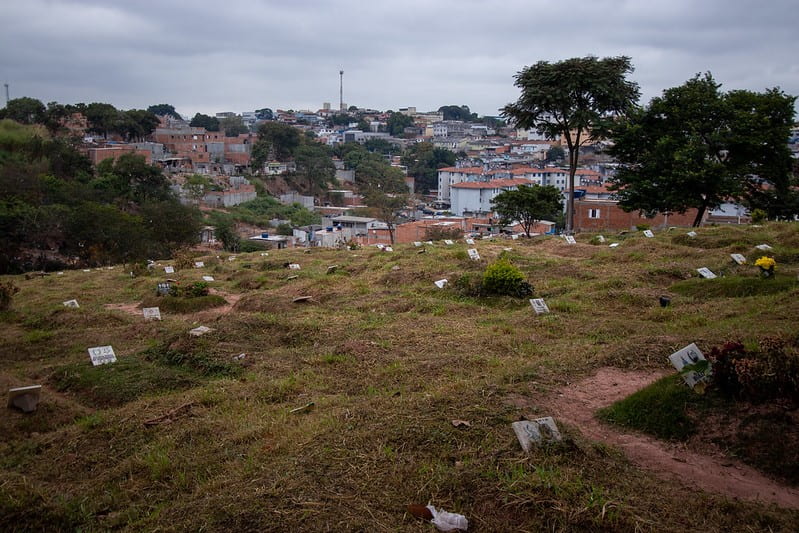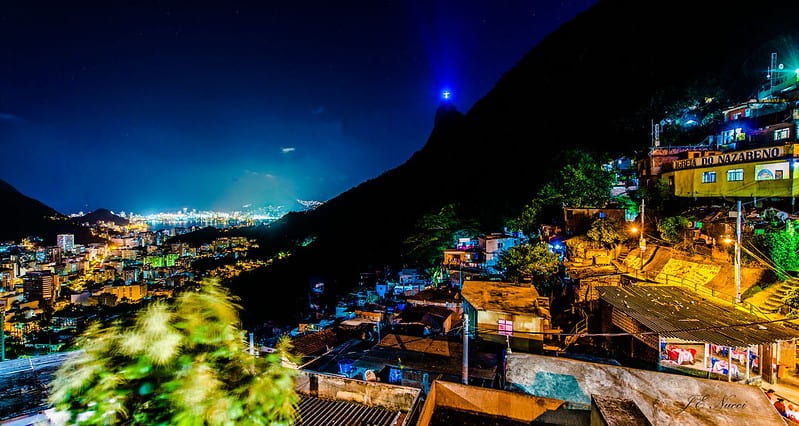As the number of novel coronavirus (COVID-19) cases continue to grow in the United States (U.S.), another epicenter has been growing in South America. As the sixth most populous country in the world, Brazil has experienced an uptick in COVID-19 cases and deaths alongside an array of national controversies that make the response efforts considerably more difficult. This blog addresses Brazil’s growing importance in the COVID-19 discussion and how it impacts human rights issues concerning indigenous peoples, environmental degradation, favela communities, and good governance.
As of late-June, more than 1.3 million Brazilians have been diagnosed with COVID-19, while over 55,000 have died from the virus. Brazil’s most populated state, São Paulo, is currently the country’s epicenter with nearly 250,000 confirmed cases of COVID-19. The northeastern state of Ceará has the country’s second-largest number of confirmed cases (100,000+), while Pará in the northwest is nearing 100,000 confirmed cases. Additionally, the iconic city of Rio de Janeiro has over 105,000 confirmed cases of COVID-19. Unfortunately, Amazonas has to the highest COVID-19 death rate of any state with 67 deaths per 100,000 cases, compared to Bahia’s 11 deaths per 100,000 cases, which highlights the disproportionate impact of COVID-19 on indigenous communities that have been systematically killed, displaced, and denied access to health care and other preventative services that could help fight the spread of the virus.
Indigenous Peoples of Brazil
As the largest Brazilian state in the Amazon region, Amazonas is known for its indigenous communities who often live in isolated villages and have poor access to health care. In the city of Manaus, which has a population of 2 million+ and is only accessible by aircraft or boat, many recent respiratory-related deaths have resulted in quick burial in mass graves, which has likely led to a severe underestimate the pandemic’s toll on the local population. In the remote community of Betania, the Tikuna tribe has five government medical workers that accommodate an approximate 4,000 inhabitants, but they are not treating the sick due to lack of protective equipment and COVID-19 testing supplies. One considerable threat are the indigenous community members who are not quarantining and are, instead, traveling in and out of town for work.
These unprecedented events compound the colonial legacy that has threatened Brazil’s indigenous peoples for centuries. Centuries ago, indigenous tribes throughout the Amazon were decimated by diseases brought by Europeans. In a way, history is repeating itself because the Brazilian government’s ineffectual response to the crisis have allowed COVID-19 to ravage the surviving indigenous communities and put them on the brink of genocide. Aside from the tribes who have contact with the modern world, the Brazilian Amazon inhabits 103 uncontacted tribes who have virtually no knowledge or resources to protect them from the threat of COVID-19. Signing this petition will help urge Brazilian officials to protect the surviving indigenous communities throughout the Amazon.
Deforestation in the Amazon
Since COVID-19 has reached these Amazonian communities, deforestation in the region has also proliferated. The Amazon is the largest rainforest in the world and is important to the global ecosystem because it absorbs approximately 5% of the world’s carbon dioxide (CO2) emissions. Thus, protecting the Amazon is pivotal for stalling the effects of climate change. However, for years, the Amazon has been ravaged to accommodate the agricultural industry as well as illegal loggers and drug traffickers. As a result, indigenous leaders fear that the COVID-19 pandemic will be used to exacerbate the destruction these industries have already caused.
During the month of April, deforestation in Brazil increased by nearly 64% which resulted in more than 150 square miles of rainforest destruction. In response, 3,000+ Brazilian soldiers were deployed to the region to prevent illegal logging and other criminal activities that contribute to deforestation. Some worry that such activity in the rainforest will lead to outsiders giving indigenous communities infectious diseases, namely COVID-19. Brazil’s Secretariat of Indigenous Health (SESAI) has made efforts to distribute N95 masks, gloves, and goggles to the region, but activists warn that the only way to protect uncontacted tribes is by keeping illegal loggers and miners out of these areas. Despite the Brazilian government establishing three military bases to prevent illegal actors from permeating the region, they are only expected to be present for 30 days. This is because Brazil’s main environmental enforcement agency, Ibama, is expected to take over these efforts but are currently understaffed and underbudgeted.
Favelas in the Age of Social Distancing
More than 11 million Brazilians live in favelas which are shantytowns outside of urban centers. Already hit hard by gun violence, unsanitary conditions, and militaristic police presence, people living in Brazil’s favelas struggle to adhere to social distancing measures. Research has found that people living favela-like conditions spend roughly 50% more time per day with others than people in less-impoverished areas. Often, favelas are composed of two or three rooms with five or six people sharing these spaces. As such, favela conditions enable the spread of COVID-19, and with precious little assistance from the government, Brazil’s most impoverished communities are left to fend for themselves.
With little government help, residents of Paraisopolis in Sao Paulo (population: 100,000) have offered a community-based solution. Due to donations and volunteer work, residents have responded to COVID-19 by organizing distribution of free meals, ambulatory services, and neighborhood watch persons. They even designated one building the quarantine house and repurposed closed schools in self-isolation centers. In Rio, members of the gang City of God drive through the local favelas, blaring a recorded message ordering people to stay home. Other gangs have become knowledgeable about COVID-19 in order to deliver essential goods to favela residents and have even gone as far to enforce social distancing measures by preventing restaurants from putting tables out. These forms of gang vigilantism in Brazil’s favelas demonstrate the lack of government support and tension with local police.

Trump of the Tropics
These criticisms are largely attributed to the leadership of Brazilian President Jair Bolsonaro who notoriously dismissed COVID-19 as a “little flu”. Aside from personally ignoring social distancing measures, Bolsonaro has organized large rallies in an effort to confront local governors who have locked down their regions. Recently, after ignoring federal regulation that require wearing a face mask in all public places, a judge ruled that Bolsonaro (and any public official) is not exempt from this policy and should expect a 2,000-reais ($387) fine like anyone else. Bolsonaro even fired his Health Minister, Luiz Mandetta, in April after he supported social distancing measures. His successor has since promoted a reopening of the economy and unproven medical treatments for COVID-19.
Known by many as the “Trump of the Tropics,” Bolsonaro has successfully maintained a strong coalition of supporters such as the agriculture community, evangelical Christians, and the military. Unlike the U.S., Brazil is an emerging economy with a weak social safety net that makes it difficult for government officials to convince people to stay at home. Health care access and the conditions to work from home are also quite limited. Recent cell phone tracking data has revealed that 45-60% of Brazilians are not complying with social distancing measures, likely due to the fact that they have to choose between feeding their families and being exposed to the virus. As such, it is assumed Bolsonaro’s defiance of a public health approach to COVID-19 is an effort to appeal to his core supporters. Bolsonaro has also slashed regulations and enforcement of land grabbing, which exacerbates the deforestation crisis currently impacting the Amazon.
Human Rights in Brazil
As demonstrated, Brazil has an array of chronic human rights problems that have been compounded by the arrival of COVID-19. In 2016, a constitutional amendment was passed that limited public expenditures in Brazil for the next 20 years. As a result, we are now witnessing how these austerity measures have affected access to housing, food, water, and sanitation when Brazilians need it the most, particularly within the most vulnerable groups – women, children, Afro-Brazilians, indigenous peoples, rural communities, and informally-settled persons.
Much like the U.S., Brazil’s COVID-19 response has mostly been subnational social distancing measures and an emergency basic income to placate the masses. However, these efforts are clearly inadequate considering Brazil’s COVID-19 cases are surging alongside another potential Zika outbreak. As a result, Brazil has effectively become the most prominent COVID-19 case study in the Global South, a nation plagued by a deadly virus and an array of human rights issues. Human rights experts suggest fiscal stimulus and social protection packages would only be the beginning of a COVID-19 response because many of these concerns are the consequence of marketization and privatization of public goods and services. As such, the COVID-19 pandemic serves as an opportunity to reverse the market-based ideology that has failed so many countries, especially the Land of the Palms.
Please sign the petition to help urge Brazilian officials to protect the surviving indigenous communities throughout the Amazon.

